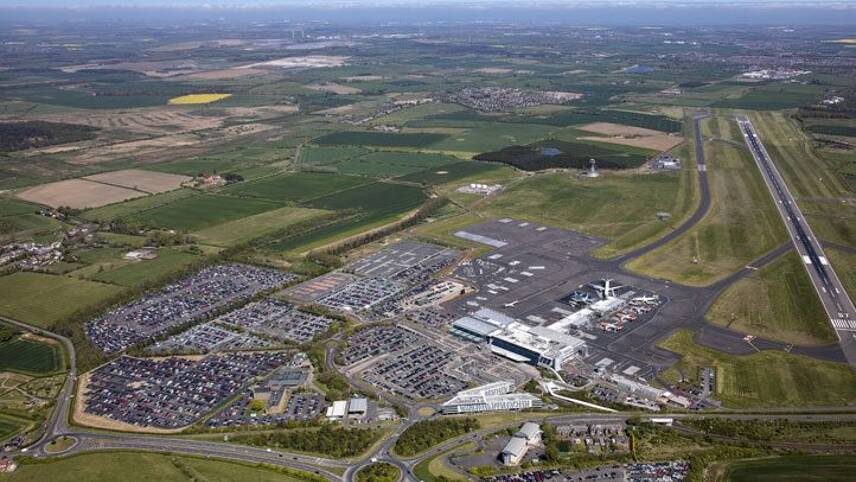Register for free and continue reading
Join our growing army of changemakers and get unlimited access to our premium content

Image: Newcastle International Airport
The Airport first announced its net-zero goal in 2019. This ambition covers all Scope 1 (direct) and Scope 2 (power-related) emissions from electricity. There is also a target to achieve carbon-neutrality for all journeys to and from the airport by staff and passengers and all waste processing, and to offset any emissions resulting from the use of solid fuels. Net-zero and carbon-neutral are often differentiated in that the former requires in-house reductions in emissions to be prioritised, while the latter can primarily rely on offsetting.
To address Scope 2 emissions, the Airport has outlined plans to develop an onsite solar farm on Airport land at the eastern end of its runway. The proposed array would have a 16MW generation capacity and would be co-located with battery energy storage units, which will help to tackle the intermittency of generation to ensure energy security.
Under the Airport’s plans, the solar and battery project would be built in four phases, with the first commencing in 2022 and the last concluding in 2035. There would also be tree planting on the land, screening the solar farm from surrounding roads and paths. This will form part of wider plans to deliver biodiversity net-gain.
The Airport has not revealed what proportion of its electricity consumption the proposed project would provide, but has stated it intends to reach 100% renewable electricity by 2035 and would prefer to include some self-generated power in the mix.
Newcastle International Airport’s chief executive Nick Jones said the project will have a “limited impact on the surrounding communities” and will play a “key part” in the net-zero strategy of the business and that of the local area. Newcastle City Council is notably striving to deliver a net-zero metropolitan borough by 2030.
“We are committed to being a good neighbour as well as a responsible organisation and, despite a very challenging last 18 months, our plan to become a net-zero emissions Airport by 2035 remains a priority,” Jones added.
The consultation will be open until 10 September. Newcastle International Airport is welcoming feedback via direct messages to its Facebook and Twitter channels as well as through the official consultation survey.
Accounting for aviation emissions
Last month, the Department for Transport (DfT) unveiled the much-anticipated Transport Decarbonisation Plan, detailing the timelines and preferred technological approaches for decarbonising all modes of transport in line with the legally binding national target.
The overarching commitments on aviation are to deliver net-zero by 2040 domestically and 2050 internationally. The domestic target covers all flights within the UK and all airport operations within England.
In the weeks leading up to the publication of the Plan, Gatwick updated its sustainability strategy with a net-zero target for Scope 1 (operational) and Scope 2 (power-related) emissions, as did Bristol Airport and the operator of Aberdeen, Glasgow and Southampton (AGS) Airports.
Some green groups are pressing airports to do more to address emissions from the flights of the airlines they host, providing their own time-bound numerical targets here. There is also growing pressure for airports like Bristol, which are not currently accounting from emissions from car journeys to and from the airport, to change their accounting approach.
Moreover, most airports with net-zero goals, as well as the DfT’s plan, do not focus on stopping airport expansion or capping growth in passenger numbers – a measure recommended by the Government’s own advisory body, the Climate Change Committee (CCC). Newcastle International Airport accommodated 5.4 million passengers in 2018 and is hoping to grow that number to 9.4 million by 2035. It has not ruled out the possibility of a new runway.
Sarah George


Please login or Register to leave a comment.